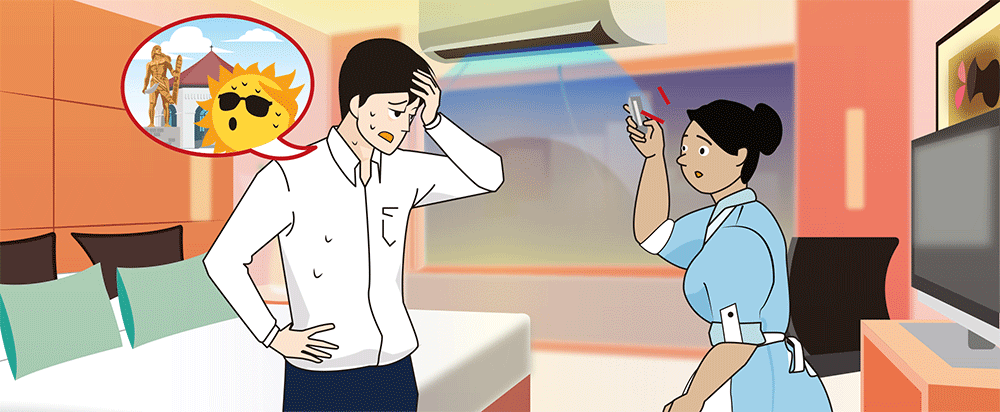Today's Point
今日のポイント語尾が〈子音字+y〉で終わるものは、yをiにしてerを付けます。例:happy→happier
語尾がeで終わるものはrを付けます。例:large→larger
語尾が〈短母音+子音字〉で終わるものは、子音字を重ねてerを付けます。例:big→bigger
キーフレーズはCebu is much hotter than Tokyo!と、hotがhotterとなっていますね。
なお、good→better、well→better、bad→worse、many/much→more、little→lessのように不規則に変化をする語もあります。
また、長い語は、前にmoreを置きます。例:more beautiful
さらに「今日のストーリー」に、Well, it gets much hotter in April and May!、Well, summer in Japan is much more humid.が出てきますが、このmuchは「非常に」という意味の副詞で、それぞれhotter、more humidを修飾しています。humid「湿度の高い」は長い語ではないのですが、moreを前に置いて比較級となります。

常夏の島、セブ。1月ですがやっぱり暑いようです。
部屋のエアコンの使い方が判らないケンは、ホテルの人に使い方を聞いています。
「セブは東京よりもずっと暑いです。」というケンですが、ホテルの人の話では4月・5月はもっと暑くなるとのこと。
春は一年の中で最も雨が降らない時期なので、一番暑いんだそうです。

Story of the Day
今日のストーリーRepeat after your teacher.
先生の後に続けて言ってみましょう。
| Ken : Excuse me. | ケン : すみません。 |
|---|---|
| Hotel employee : Yes. May I help you? | ホテルの人 : はい、なんでしょう? |
| Ken : Can you show me how to use the air conditioner? | ケン : エアコンの使い方を教えてもらえませんか? |
| Hotel employee : Yes. Of course. | ホテルの人 : はい、もちろんです。 |
| Ken : It’s so hot tonight. | ケン : 今夜はとても暑いですね。 |
| Ken : Cebu is much hotter than Tokyo! | ケン : セブは東京よりはるかに暑いですね! |
| Hotel employee : Is it? | ホテルの人 : そうですか? |
| Hotel employee : Well, it gets much hotter in April and May! | ホテルの人 : いやあ、4月や5月はもっと暑くなりますよ! |
| Ken : Wow. Really? | ケン : えっ、本当ですか? |
| Hotel employee : Yes. It’s very hot and dry in that season. | ホテルの人 : はい、その季節はとても暑くて、乾燥しています。 |
| Ken : I see. Well, summer in Japan is much more humid. | ケン : そうなんですね。まあ、日本の夏はもっとむしむししますが。 |
| Ken : Sometimes, it feels hotter than this. | ケン : ここより暑く感じることもあるぐらいです。 |
| Hotel employee : That’s interesting. | ホテルの人 : それは面白いですね。 |
| Hotel employee : Here. | ホテルの人 : ほら! |
| Hotel employee : This is how you turn on the air conditioner. | ホテルの人 : こうやってエアコンのスイッチを入れるんですよ。 |
| Ken : Thank you! | ケン : ありがとう! |
Key Phrase
キーフレーズRepeat after your teacher.
先生の後に続けて言ってみましょう。
Cebu is much hotter than Tokyo.
Vocabulary / Expressions
ボキャブラリーと表現Repeat after your teacher.
先生の後に続けて言ってみましょう。
| of course | もちろん、喜んで |
|---|---|
| humid(形容詞) | (空気や天気などが)湿気のある、むしむしする |
| turn on | スイッチ(電源)を入れる |
| Here | さあ、ほら |
Exercise
エクササイズ ARead the conversation aloud with your teacher. Fill in the blanks with a, b and c.
After that, fill in the blanks with your own words and practice the conversation with your teacher.
下記の会話の空欄に、a, b, cそれぞれの言葉を入れて、先生と一緒に音読してみましょう。
そのあと、空欄に入る言葉を自分で考えて、先生と会話をしてみましょう。

| Ken : It’s so hot ________ (a. this evening b. now c. today). | ケン : (a. 今夜は b. 今は c. 今日は)とっても暑いですね。 |
|---|---|
| Ken : Cebu is much hotter than ________ (a. Osaka b. my hometown c. the other cities)! | ケン : セブは(a. 大阪 b. 私の出身地 c. 他の都市)よりかなり暑いですね。 |
| Hotel employee : Is it? | ホテルの人 : そうですか? |
| Hotel employee : Well, it gets much hotter in April and May! | ホテルの人 : いやあ、4月や5月はもっと暑くなりますよ! |
Exercise
エクササイズ B (Vocabulary Building)Choose the correct word from the box.
空欄に当てはまる言葉を選んで文章を完成させてください。
- of course
- humid
- turn on
- ________ the room light.
- I don’t like ________ weather.
- A: Do you like summer? B: ________!
Exercise
エクササイズ CSituation : Talk about the weather in Hokkaido and Tokyo.
ロールプレイ : 北海道と東京の天候について話してください。


Extra Exercise
Try the Extra Exercises. As with Exercise A, become familiar with some of these more advanced phrases.
エクストラ・エクササイズに挑戦してみましょう。
エクササイズAと同じ要領で、より高度なフレーズを練習してみましょう。
| Ken: Did you get a chance to look at the proposals, Sato-san? |
|---|
| Sato: Yes, I did. |
| Ken: What did you think? |
| Sato: Personally, I think James’s proposal is (a. better b. more informative c. more convincing) than Jose’s. |
| ken: Did you see my proposal yet? |
| Sato: Jose’s is good too, but James really nailed it. I like how (a. practical b. feasible c. comprehensive) it is. |
| Ken: Sato-san, did you... |
| Sato: That’s it. I made my decision. James gets the top prize! |

- 動詞のnail~は「~を釘で打ちつける」という意味ですが、nail itは「(パフォーマンスなどの行為や、ある特定の作業などを)見事にやってのける/完璧に決める」という意味の決まった表現です。他にも、You nailed it! と声をかけるときは「すごいね!」「うまくいったね!」というようなニュアンスになります。
- informativeは「情報や知識を与える」、convincingは「説得力のある」、practicalは「実践的な」、comprehensiveは「包括的な」。